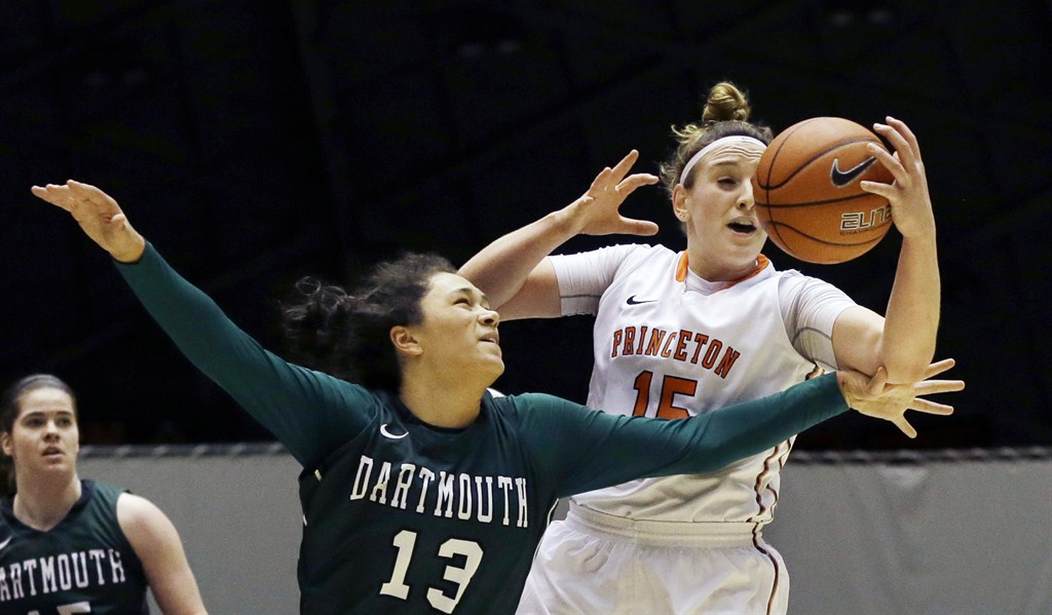The Dartmouth men's basketball team voted 13-2 to form a union in a direct challenge to the antiquated NCAA amateur model.
College athletes are not amateurs. But are they professionals? This "in-between" status will become the source of controversy as the multi-billion dollar business of college athletics fights it out with powerful unions who will represent the athletes.
Dartmouth basketball will be represented by the Service Employees International Union (SEIU), one of the most radical unions in the United States. SEIU has been aggressively unionizing industries that are traditionally non-union in healthcare and public service. Tapping into amateur athletics is the motherlode.
The National Labor Relations Board cleared a path for unionizing college athletics by stretching the definition of "employees" almost beyond recognition. Late last year, the NLRB issued a rule that radically altered "the franchisor-franchisee relationship, potentially shaking the foundation of a key system that contributes to the U.S. economy."
Imagine the opportunity for strikes and other work actions during the NCAA tournaments.
The election was ordered by the NLRB’s regional director, Laura Sacks, who had concluded that the players are employees “because Dartmouth has the right to control the work performed by the Dartmouth men’s basketball team, and the players perform that work in exchange for compensation.” That decision followed a memo from the NLRB’s general counsel in September 2021 setting out her position that college players are employees under the National Labor Relations Act.
Dartmouth immediately filed a request for Sacks’s decision to be reviewed.
College athletes may not be amateurs, but pit the NCAA Division I champion against the worst NBA team and watch the slaughter. The kids wouldn't have a chance.
“We always negotiate in good faith and have deep respect for our 1,500 union colleagues, including the members of SEIU Local 560. In this isolated circumstance, however, the students on the men’s basketball team are not in any way employed by Dartmouth,” said a spokeswoman for Dartmouth in a statement. “Classifying these students as employees simply because they play basketball is as unprecedented as it is inaccurate.”
They don't get it. Reason, logic, commonsense — none of it matters. This is about power and how to apply it as broadly as possible.
The NCAA says that it's "making changes to deliver more benefits to student-athletes, including guaranteed health care and guaranteed scholarships, but the NCAA and student-athlete leadership from all three divisions agree college athletes should not be forced into an employment model.”
In truth, Dartmouth is an unlikely candidate to bring down the NCAA. Its basketball team hasn't had a winning record since the 1990s, and it hasn't appeared in the NCAA tournament since 1959. Not only that, but no Ivy League school offers scholarships to its athletes in any sport.
Now, though, those players are central characters in a new and fraught chapter in college athletics. For as long as the NCAA has existed, the association has maintained that its athletes are unpaid amateur students, not professional employees.
It’s a position the association has defended for decades in court, and enforced rigorously against its members. It used to be that accepting so much as a penny, let alone a free granola bar, was impermissible for college athletes.
That stance has shifted in the wake of legal decisions that have loosened the restrictions on the education-linked benefits schools can give to athletes, now up to $5,280 a year, and a wave of state laws that have made it possible for athletes to sign endorsement deals with third parties that can be worth millions. (They can also now receive unlimited snacks.)
“These young men will go down as one of the greatest basketball teams in all of history,” said SEIU International President Mary Kay Henry. “The Ivy League is where the whole scandalous model of nearly free labor in college sports was born and that is where it is going to die.”
"Nearly free labor"? Orwell would be proud.
Some believe that unions sound the death knell of college sports. Some smaller colleges will be forced to cut major sports like football and basketball altogether. And what of athletes who don't want to join a union?
Major sports like football and basketball at big schools get rich thanks to bloated TV contracts. Will people keep watching if players start acting more like unions than athletes?










Join the conversation as a VIP Member